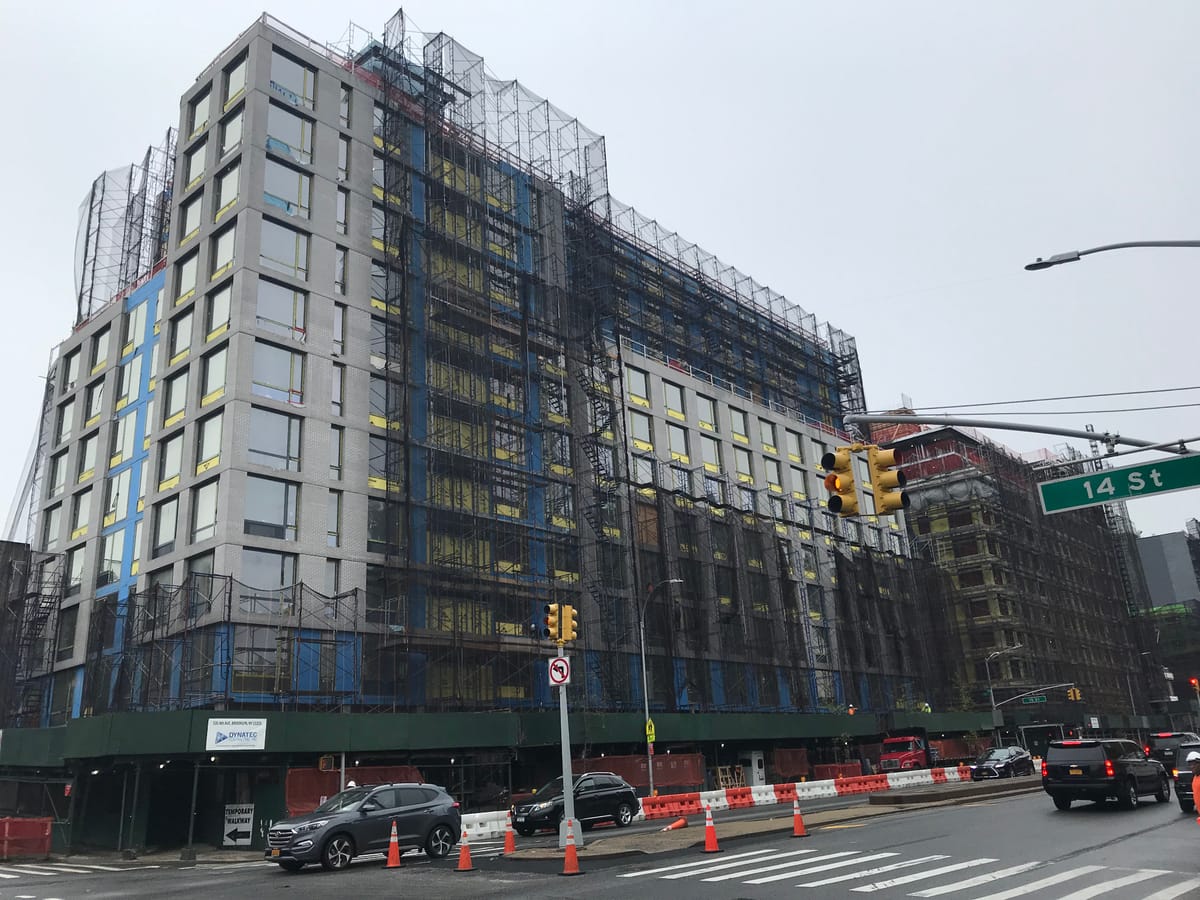“Someone Is Getting Very, Very Rich”: Neighbors Call For More Details To Be Released About Park Slope Homeless Shelters

PARK SLOPE – Opponents of two planned Park Slope homeless shelters alleged at a public contract hearing on Thursday that the city, the homeless services provider Women in Need (WIN), and the developers Slate and Adam America have inflated the contracts’ value by approximately $73.7 million, money they said was making someone “very, very rich” off of public money designated for homeless New Yorkers.

The alleged $73.7 million discrepancy is part of the $261 million total contract value over nine years that the city is paying WIN to operate the two shelters which will include 253 units for homeless families and various services such as childcare, mental health services, and assistance in finding jobs and permanent housing.
The shelters, at 535 and 555 4th Avenue, are scheduled to open in September and December of this year, respectively, but the draft contracts available for public review at the offices of the Human Resources Administration are extremely scant on details, only listing the total aggregate amount the city will spend on each shelter and not breaking it down into per-unit rents, personnel costs, or shelter operating budgets.
Both supporters and opponents of the proposed shelters packed the room at the Department of Citywide Administrative Services’ (DCAS) Spector Hall in Manhattan for the contract hearing, and their testimony dominated the proceedings, which included several other contracts of far smaller dollar amounts.
In his testimony, Fourth Avenue Neighbors member Daniel Price broke down how he had arrived at the alleged $73.7 million figure: he calculated that 555 4th Ave’s per-unit monthly cost was $10,557, substantially higher than the area’s average market rent.
He then factored in a market rent estimate of around $2,600 based on a Zillow search, and compared that to monthly costs at another WIN shelter in Brooklyn, on Junius Street in East New York—where he acknowledged that rent would be lower but argued that services should cost the same—and multiplied the difference in service costs by the number of units.
“Someone is getting very, very rich off this contract, and it isn’t my fellow New Yorkers experiencing homelessness,” Price said.
Price also expressed disdain at the secrecy of the process and, in concert with other opponents, said the alleged discrepancy may warrant a criminal investigation.
“The secrecy, dishonesty, and lack of transparency in this process, at best, violates nearly every principle of good government and, at worst, coupled with the extreme cost inflation, is either conducive to or indicative of possible corruption or misappropriation,” Price said. He and others insisted that the opposition to the shelter was rooted in the process and in the discrepancies rather than in NIMBYism, noting that he was in support of permanently affordable housing at the site rather than temporary shelter.
In an email to Bklyner, a representative for DHS provided documents stating that annual costs at the shelters would be $17 million at 535 (including $6.3 million for rent) and $13 million at 555 (including $4.6 million for rent); per-unit monthly rent would be $3,500 and $3,600 respectively. DHS said that the costs were explained by services, staffing, overhead, and other factors that make it very expensive to run a shelter in New York. WIN declined to comment.
Price called for the extension of the public input period until the draft contract provides more details, arguing that the public cannot give informed input on a contract without more information. When he and other FAN members confronted Paul Romain, the Human Resources Administration’s Chief Contracting Officer, after the hearing, Romain would not commit to extending the public comment period.
“I cannot answer anything on that,” Romain said. “What we showed you was a draft contract.”
Those in favor of the shelters also showed up to the hearing in force, with the largest contingent being affiliated with the Brooklyn Children’s Theater (BCT). Supporters argued that locating homeless shelters in Park Slope offered children resources for success such as good transit and schools—resources not present in more far-flung neighborhoods that are further from where people work.
“Park Slope offers unparalleled access to resources and enrichment opportunities like free after-school programs for children of all ages that other neighborhoods do not,” said Amy White Graves, executive director of BCT. Others said that while the lack of transparency in the project was concerning, homeless families shouldn’t be punished for the malfeasance of city officials and developers.
Helen Ho, a Park Slope resident, disputed the opponents’ numbers as inflated and noted that the non-rent costs would be spent on numerous expensive services. She also said that the shelters would allow the city to stop housing the homeless in less cost-efficient cluster sites and hotels, and criticized the opposition as disingenuous.
“We need traditional shelters with services,” Ho said. “Some of those opposing the shelters fear our neighborhood is too weak to help families going through a tough time, but they’re wrong.”
Park Slope residents have been engaged in a fierce battle over the shelters for weeks. After the announcement of the two planned facilities, opponents launched a petition on change.org arguing that the shelters would be out of character, bring in a large “transient” population uninvested in the neighborhood long-term, and would “strain” the neighborhood’s resources.
Shelter supporters launched a counter-petition to demonstrate the community’s support for having homeless families as neighbors and to counteract some of the claims that the shelters would overburden the neighborhood.
As of Thursday, the pro-shelter petition has over twice as many signatures as the anti-shelter one, with 2,700 people signing in support compared to 1,300 against.



